- Home
- Nicholas Sparks
The Last Song Page 7
The Last Song Read online
Page 7
"She's not a vampire."
"Yeah, I saw her. On the short side, ugly purple streak in her hair, black fingernail polish? You poured your soda over her, remember? She thought you smelled."
"What?"
"I'm just saying," he said, reaching for the pan. "You didn't notice her expression after you slammed into her, but I did. She couldn't get away from you fast enough. Hence, you probably smelled."
"She had to buy a new shirt."
"So?"
Will added the second can. "I don't know. She just surprised me. And I haven't seen her around here before."
"I repeat: So?"
The thing was, Will wasn't exactly sure why he was thinking about the girl. Particularly considering how little he knew about her. Yeah, she was pretty--he'd noticed that right off, despite the purple hair and dark mascara--but the beach was full of pretty girls. Nor was it the way she'd stopped the fight in its tracks. Instead, he kept coming back to the way she'd treated the little boy who'd fallen. He'd glimpsed a surprising tenderness beneath her rebellious exterior, and it had piqued his curiosity.
She wasn't like Ashley at all. And it wasn't that Ashley was a bad person, because she wasn't. But there was something superficial about Ashley, even if Scott didn't want to believe it. In Ashley's world, everyone and everything was put into neat little boxes: popular or not, expensive or cheap, rich or poor, beautiful or ugly. And he'd eventually grown tired of her shallow value judgments and her inability to accept or appreciate anything in between.
But the girl with the purple streak in her hair...
He knew instinctively that she wasn't that way. He couldn't be absolutely sure, of course, but he'd bet on it. She didn't put others into neat little boxes because she didn't put herself in one, and that struck him as refreshing and different, especially when compared with the girls he'd known at Laney. Especially Ashley.
Though things were busy at the garage, his thoughts kept drifting back to her more often than he expected.
Not all the time. But enough to make him realize that for whatever reason, he definitely wanted to get to know her a little better, and he found himself wondering whether he would see her again.
8
Ronnie
Blaze led the way to the diner Ronnie had seen on her walk through the business district, and Ronnie had to admit that it did have some charm, particularly if you were fond of the 1950s. There was an old-fashioned counter flanked with stools, the floor was black and white tiles, and cracked red vinyl booths lined the walls. Behind the counter, the menu was written on a chalkboard, and as far as Ronnie could tell, the only change to it in the last thirty years had been the prices.
Blaze ordered a cheeseburger, a chocolate shake, and French fries; Ronnie couldn't decide and ended up ordering only a Diet Coke. She was hungry, but she wasn't exactly sure what kind of oil they used in their deep fryer, and neither, it seemed, was anyone else at the diner. Being a vegetarian wasn't always easy, and there were times when she wanted to give up the whole thing.
Like when her stomach was growling. Like right now.
But she wouldn't eat here. She couldn't eat here, not because she was a vegetarian-on-principle kind of person, but because she was vegetarian-because-she-didn't-want-to-feel-sick kind of person. She didn't care what other people ate; it was just that whenever she thought about where meat actually came from, she'd imagine a cow standing in a meadow or Babe the pig, and she'd feel herself getting nauseated.
Blaze seemed happy, though. After she placed her order, she leaned back in the booth. "What do you think about the place?" she asked.
"It's neat. It's kind of different."
"I've been coming here since I was a kid. My dad used to bring me every Sunday after church for a chocolate shake. They're the best. They get their ice cream from some tiny place in Georgia, but it's amazing. You should get one."
"I'm not hungry."
"You're lying," Blaze said. "I heard your stomach growling, but whatever. It's your loss. But thanks for this."
"No big deal."
Blaze smiled. "So what happened last night? Are you like... famous or something?"
"Why would you ask that?"
"Because of the cop and the way he singled you out. There had to be a reason."
Ronnie made a face. "I think my dad told him to go find me. He even knew where I lived."
"Sucks being you."
When Ronnie laughed, Blaze reached for the saltshaker. After tipping it over, she began sprinkling salt onto the table while using a finger to mold it into a pile.
"What did you think of Marcus?" she asked.
"I didn't really talk to him. Why?"
Blaze seemed to choose her words carefully. "Marcus never liked me," she said. "Growing up, I mean. I can't say that I liked him very much, either. He was always kind of... mean, you know? But then, I don't know, a couple of years ago, things changed. And when I really needed someone, he was there for me."
Ronnie watched the salt pile grow. "And?"
"I just wanted you to know."
"Fine," she said. "Whatever."
"You too."
"What are you talking about?"
Blaze scraped some of the black polish from her fingernails. "I used to compete in gymnastics, and for maybe four or five years, it was the biggest thing in my life. I ended up quitting because of my coach. He was a real hard-ass, always telling you what you did wrong, never complimenting you on what you did right. Anyway, I was doing a new dismount off the beam one day, and he marched forward screaming at me about the proper way to plant and how I have to freeze and everything I'd heard him scream about a million times before. I was tired of hearing it, you know? So I said, 'Whatever,' and he grabbed my arm so hard that he left bruises. Anyway, he says to me, 'Do you know what you're saying when you say, "Whatever"? It's just a code word for the f-word, followed by "you." And at your age, you never, ever say that to anyone.'" Blaze leaned back. "So now, when someone says it to me, I just say, 'You too.'"
Right then, the waitress arrived with their food, and she placed it in front of them with an efficient flourish. When she was gone, Ronnie reached for her soda.
"Thanks for the heartwarming story."
"Whatever."
Ronnie laughed again, liking her sense of humor.
Blaze leaned across the table. "So what's worst thing you've ever done?"
"What?"
"I'm serious. I always ask people that question. I find it interesting."
"All right," Ronnie countered. "What's the worst thing you've ever done?"
"That's easy. When I was little, I had this neighbor--Mrs. Banderson. She wasn't the nicest lady, but she wasn't a witch, either. I mean, it's not like she locked her doors on Halloween or anything. But she was really into her garden, you know? And her lawn. I mean, if we ever walked across it on our way to the school bus, she'd come storming out, screaming that we were ruining the grass. Anyway, one spring, she planted all these flowers in her garden. Hundreds of them. It was gorgeous. Well, there was this kid across the street named Billy, and he didn't like Mrs. Banderson much, either, because one time he'd hit a baseball and it went into her backyard, and she wouldn't give it back. So one day, we were poking around his garden shed, and we came across this big sprayer filled with Roundup. The weed killer? Well, he and I snuck out after dark one night and sprayed all those new flowers, don't ask me why. I guess at the time we thought it would be kind of funny. No big deal. Just buy some new ones, right? You couldn't tell right away, of course. It takes a few days before it starts working. And Mrs. Banderson was out there every day, watering and pulling weeds before she noticed that all her new flowers had started to wilt. At first, Billy and I laughed about it, but then I started to notice she'd be out there before school trying to figure out what was wrong, and she'd still be out there when I came back from school. And by the end of the week, all of them were dead."
"That's terrible!" Ronnie cried, giggling despite herself.
/> "I know. And I still feel bad about it. It's one of those things that I wish I could undo."
"Did you ever tell her? Or offer to replace the flowers?"
"My parents would have killed me. But I never, ever walked across her lawn again."
"Wow."
"Like I said, it's the worst thing I've ever done. Now it's your turn."
Ronnie thought about it. "I didn't talk to my dad for three years."
"I already know that. And it's not that bad. Like I said, I try not to talk to my dad, either. And my mom has no idea where I am most of the time."
Ronnie glanced away. Above the jukebox was a picture of Bill Haley & His Comets.
"I used to shoplift," she said, subdued. "A lot. Nothing big. Just more for the thrill of doing it."
"Used to?"
"Not anymore. I got caught. Actually, I got caught twice, but the second time it was an accident. It went to court, but the charges were continued for a year. Basically, it means that if I don't get in trouble again, the charges will be dismissed."
Blaze lowered her burger. "That's it? That's the worst thing you've ever done?"
"I never killed someone's flowers, if that's what you mean. Or vandalized anything."
"You've never stuck your brother's head in the toilet? Or crashed the car? Or shaved the cat or something?"
Ronnie gave a small smile. "No."
"You're probably the most boring teenager in the world."
Ronnie giggled again before taking a sip of her soda. "Can I ask you a question?"
"Go ahead."
"Why didn't you go home last night?"
Blaze took a pinch of the salt she'd piled up and sprinkled it over her fries. "I didn't want to."
"What about your mom? Doesn't she get mad?"
"Probably," Blaze said.
Off to the side, the door to the diner swung open and Ronnie turned to see Marcus, Teddy, and Lance heading toward their booth. Marcus wore a T-shirt emblazoned with a skull, and a chain was attached to the belt loop of his jeans.
Blaze scooted over, but strangely, Teddy took a seat beside her while Marcus squeezed in next to Ronnie. As Lance pulled up a chair from an adjoining table and flipped it around before sitting, Marcus reached for Blaze's plate. Both Teddy and Lance automatically grabbed for the fries.
"Hey, that's for Blaze," Ronnie cried, trying to stop them. "Get your own."
Marcus turned from one to the other. "Yeah?"
"It's okay," Blaze said, pushing the plate toward him. "Really. I won't be able to eat it all anyway."
Marcus reached for the ketchup, acting as though he'd proved his point. "So what are you two talking about? From the window, it looked intense."
"Nothing," Blaze said.
"Let me guess. She's telling you about her mom's sexy boyfriend and their late night trapeze acts, right?"
Blaze wiggled in her seat. "Don't be gross."
Marcus gave Ronnie a frank stare. "Did she tell you about the night one of her mom's boyfriends came sneaking into her room? She was like, 'You've got fifteen minutes to get the hell out of here.'"
"Shut up, okay? That's not funny. And we weren't talking about him."
"Whatever," he said, smirking.
Blaze reached for her shake as Marcus began eating the burger. Teddy and Lance grabbed more fries, and over the next few minutes, the three of them devoured most of what was on the plate. To Ronnie's dismay, Blaze said nothing, and Ronnie wondered about that.
Or actually, she didn't wonder. It seemed obvious that Blaze didn't want Marcus to get mad at her, so she let him do whatever he wanted. She'd seen it before: Kayla, for all her tough posturing, was the same way when it came to guys. And generally, they treated her like dirt.
But she wouldn't say that here. She knew it would only make things worse.
Blaze sipped her milkshake and put it back on the table. "So what do you guys want to do after this?"
"We're out," Teddy grunted. "Our old man needs me and Lance to work today."
"They're brothers," Blaze explained.
Ronnie studied them, not seeing the resemblance. "You are?"
Marcus finished the burger and pushed the plate to the center of the table. "I know. It's hard to believe parents could have two such ugly kids, huh? Anyway, their family owns a piece-of-crap motel just over the bridge. The pipes are like a hundred years old, and Teddy's job is to plunge the toilets when they get clogged."
Ronnie wrinkled her nose, trying to imagine it. "Really?"
Marcus nodded. "Gross, huh? But don't worry about Teddy. He's great at it. A real prodigy. He actually enjoys it. And Lance here--his job is to clean the sheets after the noontime crowd rolls through."
"Ew," Ronnie said.
"I know. It's totally disgusting," Blaze added. "And you should see some of the people that go for the hourly rates. You could catch a disease just walking into the room."
Ronnie wasn't sure how to respond to that, so instead she turned to Marcus. "So what do you do?" she asked.
"Whatever I want," he answered.
"Which means?" Ronnie challenged.
"Why do you care?"
"I don't," she said, keeping her voice cool. "I was just asking."
Teddy grabbed the last of the fries from Blaze's plate. "It means he hangs out at the motel with us. In his room."
"You have a room at the motel?"
"I live there," he said.
The obvious question was why, and she waited for more, but Marcus stayed quiet. She suspected he wanted her to attempt to tease the information out of him. Maybe she was reading too much into it, but she had the sudden sense that he wanted her to be interested in him. Wanted her to like him. Even though Blaze was right there.
Her suspicions were confirmed when he reached for a cigarette. After he lit it, he blew the smoke toward Blaze, then turned to Ronnie.
"What are you doing tonight?" he asked.
Ronnie shifted in her seat, suddenly uncomfortable. It seemed like everyone, Blaze included, was waiting for her answer.
"Why?"
"We're having a little get-together at Bower's Point. Not just us. A bunch of people. I want you to come. Without the cops this time."
Blaze studied the tabletop, toying with the pile of salt. When Ronnie didn't answer, Marcus rose from the table and headed for the door without turning back.
9
Steve
Hey, Dad," Jonah called out. He was standing behind the piano in the alcove as Steve brought the plates of spaghetti to the table. "Is that a picture of you with Grandma and Grandpa?"
"Yeah, that's my mom and dad."
"I don't remember that picture. From the apartment, I mean."
"For a long time, it was in my office at school."
"Oh," Jonah said. He leaned closer to the photo, studying it. "You kind of look like Grandpa."
Steve wasn't sure what to think about that. "Maybe a little."
"Do you miss him?"
"He was my dad. What do you think?"
"I'd miss you."
As Jonah came to the table, Steve reflected that it had been a satisfying, if uneventful, day. They'd spent the morning in the shop, where Steve had taught Jonah to cut glass; they'd eaten sandwiches on the porch and collected seashells in the late afternoon. And Steve had promised that as soon as it was dark, he would take Jonah for a walk down the beach with flashlights to watch the hundreds of spider crabs darting in and out of their sand burrows.
Jonah pulled out his chair and plopped down. He took a drink of milk, leaving a white mustache. "Do you think Ronnie's coming home soon?"
"I hope so."
Jonah wiped his lip with the back of his hand. "Sometimes she stays out pretty late."
"I know."
"Is the police officer going to bring her back home again?"
Steve glanced out the window; dusk was coming, and the water was turning opaque. He wondered where she was and what she was doing.
"No," he said. "Not tonight
."
After their walk along the beach, Jonah took a shower before crawling into bed. Steve pulled up the covers and kissed him on the cheek.
"Thanks for the great day," Steve whispered.
"You're welcome."
"Good night, Jonah. I love you."
"Me, too, Dad."
Steve rose and started for the door.
"Hey, Dad?"
Steve turned. "Yes?"
"Did your dad ever take you out to look for spider crabs?"
"No," Steve said.
"Why not? That was awesome."
"He wasn't that kind of father."
"What kind was he?"
Steve considered the question. "He was complicated," he finally said.
At the piano, Steve recalled the afternoon six years earlier when he took his father's hand for the first time in his life. He had told his father that he knew he'd done the best he could in raising him, that he didn't blame his father for anything, and that most of all, he loved him.
His father turned toward him. His eyes were focused, and despite the high doses of morphine that he'd been taking, his mind was clear. He stared at Steve for a long time before pulling his hand away.
"You sound like a woman when you talk like that," he said.
They were in a semiprivate room on the fourth floor of the hospital. His father had been there for three days. IV tubes snaked out of his arms, and he hadn't eaten solid food in more than a month. His cheeks were sunken, and his skin was translucent. Up close, Steve thought his father's breath smelled of decay, another sign the cancer was announcing its victory.
Steve turned toward the window. Outside, he could see nothing but blue skies, a bright, unyielding bubble surrounding the room. No birds, no clouds, no visible trees. Behind him, he could hear the steady beep of the heart monitor. It sounded strong and steady, with regular rhythm, making it seem that his father would live another twenty years. But it wasn't his heart that was killing him.
"How is he?" Kim asked later that night when they were talking on the phone.
"Not good," he said. "I don't know how much longer he has, but..."
He trailed off. He could imagine Kim on the other end, standing near the stove, stirring pasta or dicing tomatoes, the phone cocked between her ear and shoulder. She'd never been able to sit still when talking on the phone.
"Did anyone else come by?"
"No," he answered. What he didn't tell her was that according to the nurses, no one else had visited at all.

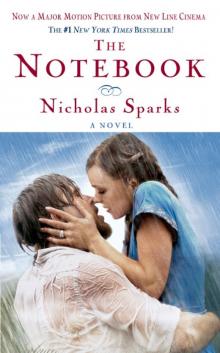 The Notebook
The Notebook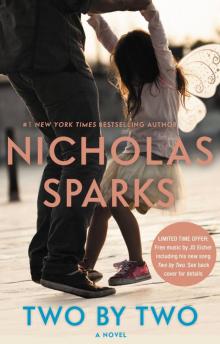 Two by Two
Two by Two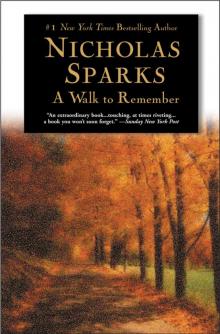 A Walk to Remember
A Walk to Remember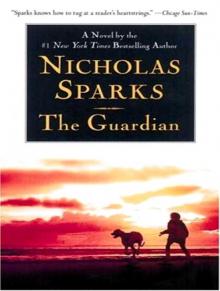 The Guardian
The Guardian Dear John
Dear John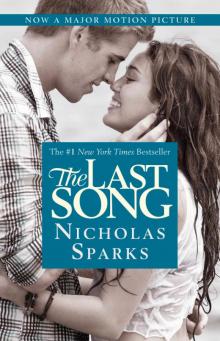 The Last Song
The Last Song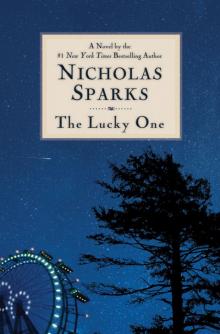 The Lucky One
The Lucky One The Wedding
The Wedding The Longest Ride
The Longest Ride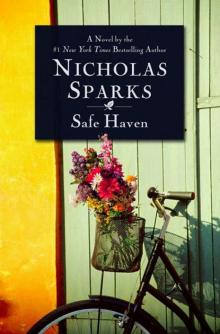 Safe Haven
Safe Haven The Rescue
The Rescue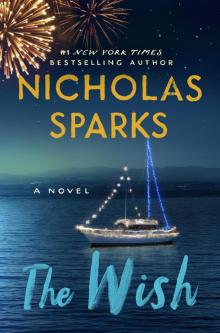 The Wish
The Wish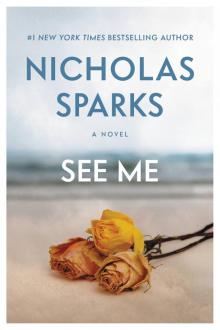 See Me
See Me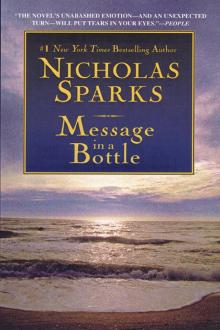 Message in a Bottle
Message in a Bottle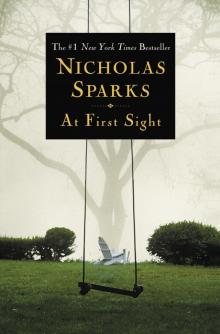 At First Sight
At First Sight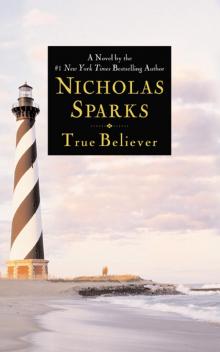 True Believer
True Believer The Return
The Return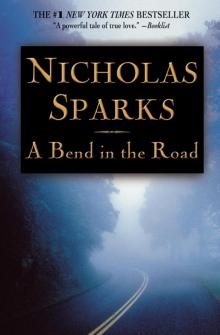 A Bend in the Road
A Bend in the Road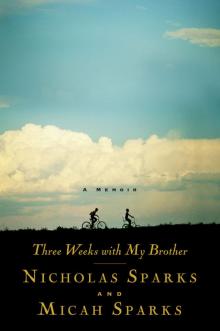 Three Weeks With My Brother
Three Weeks With My Brother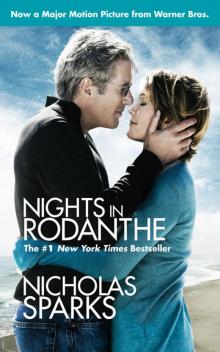 Nights in Rodanthe
Nights in Rodanthe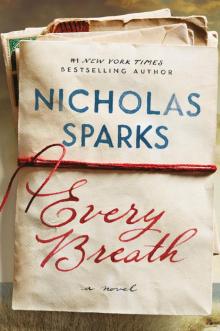 Every Breath
Every Breath